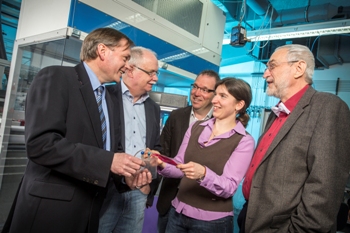Jun 11 2013
Plastic bags coated by plasma at atmospheric pressure serve as a GMP laboratory for the cultivation of adherent cells. The plasma is used to modify the internal surface of the bag specifically, so that different cell types can grow on it.
 The prize-winning team presents a bag whose inner surface is modified using plasma – Henk Garritsen, Werner Lindenmaier, Michael Thomas, Kristina Lachmann, Kurt Dittmar (from left to right). © Dirk Mahler/Fraunhofer
The prize-winning team presents a bag whose inner surface is modified using plasma – Henk Garritsen, Werner Lindenmaier, Michael Thomas, Kristina Lachmann, Kurt Dittmar (from left to right). © Dirk Mahler/Fraunhofer
It sounds like one of those puzzles where you have to change a matchstick figure into something else without adding or taking away any matches: How do you alter the inside of a closed bag without opening it? Impossible, I hear you say. But that is precisely what a team of researchers under Dr. Kristina Lachmann and Dr. Michael Thomas at the Fraunhofer Institute for Surface Engineering and Thin Films IST in Braunschweig have managed to do. They use plasma to activate the inner surfaces of plastic bags. The plasma acts as a disinfectant while also transforming the surface of the bag so that cells want and are able to grow on it.
“Our goal was to realize a closed system in which cells grow undisturbed and without the risk of contamination,” says Dr. Henk Garritsen from Braunschweig Municipal Hospital (Städtisches Klinikum Braunschweig). “Coating the bags with plasma enables us to use them as a GMP laboratory.” The background to these endeavors is stem cell research and the idea of treating illnesses with stem cells that come from the patient’s own body. Until now researchers have mostly used Petri dishes, bottles, and bioreactors in a sterile environment for cultivating stem cells. However, these systems have to be opened in order to refill culture media or extract cells. This leads time and again to contamination, and the painstakingly cultivated cells become unusable.
Plasma coatings for different cell types
At the Helmholtz Centre for Infection Research in Braunschweig, Dr. Werner Lindenmaier and Dr. Kurt Dittmar were already working on bags for cultivating stem cells, but without making the breakthrough they were looking for. The geographical proximity and the expertise of Fraunhofer IST researchers in plasma coating brought the two teams together. Initial tests showed that the cells grow on plasma-coated films. A joint project sponsored by the German Federal Ministry of Economics and Technology BMWi set out to investigate the closed bag system and cell growth in greater detail.
The key part of the method is coating with plasma. To achieve this, ordinary bags such as those used for infusions are filled with a noble gas and voltage is applied. “This produces plasma inside the bag for a short period – a luminous, ionized gas that chemically alters and at the same time disinfects the surface of the plastic,” explains Dr. Kristina Lachmann from Fraunhofer IST. Bags were coated in a pilot plant at Fraunhofer IST, and then tests were carried out at the Helmholtz Centre for Infection Research and Braunschweig Municipal Hospital to determine which coating is best suited for which type of cell. “We work with stem cells for bones, cartilage, fat, and nerves – the coating can be optimized for each of these cell types,” says Dr. Kurt Dittmar.
The pilot plant at Fraunhofer IST has now been optimized to the extent that the individual coating steps are automated. This makes it possible to manufacture standardized and reproducibly modified bags for cell cultivation. “We use medically approved bags for the coating,” says Dr. Michael Thomas. “Nevertheless, the plasma treatment must be demonstrated to be innocuous before being approved for clinical use.”
For their work in developing plasma in bags for cell cultivation in closed systems, Dr. Kristina Lachmann, Dr. Michael Thomas, Dr. Henk Garritsen, Dr. Werner Lindenmaier, and Dr. Kurt E.J. Dittmar are receiving the Fraunhofer prize for human-centered technology.